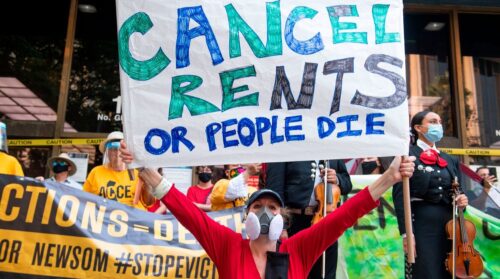On December 5, 2020, New Orleans elected its first ever progressive District Attorney. Jason Williams, who was a criminal defense lawyer for over 20 years before being elected, replaced former DA Leon Cannizzaro, described by New Orleans papers as a traditional tough on crime prosecutor. An unprecedented coalition of grassroots justice organizations came together over a year before the election, as The Peoples DA Coalition, to help make it happen.
The Peoples DA Coalition, made up of over 30 local justice organizations, worked for over a year to “create a District Attorney’s office that is ethical, equitable, compassionate, and accountable to all of its constituents so that we may end the era of mass incarceration in New Orleans.”
Immediately upon taking office, New Orleans District Attorney Jason Williams showed why he is on the way to becoming a progressive prosecutor. He established a vigorous civil rights unit to review questionable convictions, began to reduce the instances where the prosecution required cash bail, quit using Louisiana’s habitual offender law, mostly stopped prosecuting juveniles in adult court, dismissed hundreds of low level drug cases, and granted new trials to dozens of people convicted by non-unanimous juries. More changes are coming.
How did such a progressive candidate get elected in Louisiana, a deep south state which has for years been locking up more of its citizens than any other?
There were three keys to New Orleans electing its first progressive prosecutor. Two were traditional. The third was unprecedented. First, the winner of the race, Jason Williams, was an excellent campaigner and a well-known and respected candidate. But he faced challenges because he had run and lost before and he faces uncertainty because of outstanding federal criminal tax charges. Second, it helped that the incumbent retired at the last minute. But other incumbents have retired before and no reform prosecutor emerged. Third was the remarkable emergence of a vigorous nonpartisan grass roots coalition of dozens of organizations and scores of activists who identified the important issues, educated the community, and activated people to vote for big time reform in the criminal legal system.
The organization that led the New Orleans community nonpartisan efforts to elect a reform prosecutor is the Peoples DA Coalition. It brought a surge of grass roots organizing and energy for major reform into the criminal legal system in New Orleans in their focus on this election.
The idea started 14 months before the election. A few criminal justice advocates wondered if it just might be possible to create a broad-based community coalition to educate and activate voters to make the fall 2020 election for New Orleans District Attorney a referendum on dramatic changes in the criminal legal system? There had been some statewide progress on reform in the past few years, why not push for stronger reform locally? They quickly decided that no one organization could quarterback such an effort so they brought together a wide range of other organizations to dream and plan and work for real change.
The Peoples DA Coalition grew to include over 30 community organizations and hundreds of activists. Their shared goal was to elect a District Attorney who was serious about changing the criminal legal system and to be responsive to the people of New Orleans. The organizations involved included those led by formerly incarcerated residents, crime survivors, people who were wrongfully convicted, families with incarcerated loved ones, immigrant rights, and others focused on criminal justice reform in New Orleans.
Together these thirty plus organizations recognized the opportunity to create a new vision for the New Orleans District Attorney’s Office. They demanded “a reform Prosecutor who embraces fairer, safer, more effective approaches to criminal justice.”
The coalition refused to back or oppose any specific candidate. They were clear. Their goal was to listen to and organize with grassroots organizations and to bring about serious change in the way the criminal legal system worked in New Orleans. How? By educating the city-wide community and activating people to turn out and vote for serious reform in the race for prosecutor. Their plan was that whoever was elected was accountable to the people.
Former Criminal Court Judge Calvin Johnson was asked to lead the coalition. Judge Johnson is a highly regarded justice leader who served as a law professor, former chief judge of the Orleans Parish Criminal District Court and after retiring from the bench, criminal justice coordinator for the City of New Orleans.
Judge Johnson has been aware of the need for dramatic changes in the criminal legal system for over 50 years. “In 1962, when I was just 14 years old, a young football player in my hometown of Plaquemine was accused and prosecuted for allegedly assaulting his white girlfriend. I remember sitting in the balcony of the courthouse and watching as this Black teenage boy was denied anything close to a fair trial. It was then that I realized how tragically flawed the system is. That moment sent me on my life’s journey toward advocating for a system that doesn’t punish people simply for being Black.”
Why did Judge Johnson agree to lead this specific effort? “As a former judge who has spent most of my adult life operating within the system, I can state unequivocally that the district attorney is the single most powerful person in the criminal justice system. If we are serious about fundamentally changing the trajectory of a system that over-polices, over-prosecutes and over-incarcerates, then we must elect a district attorney who is actually for reform.”
The Peoples DA Coalition established itself as a tax-deductible non-profit, said Johnson, and from the beginning did not endorse any candidate. It was able to raise some local and national funds from individuals and foundations to hire two staff. They asked Louisiana native Victoria Coy to come on as coordinator. Color of Change, a national racial justice advocacy organization, partnered to help on several levels including helping create the organization’s website, strategizing, and running the technology for online forums.
The hardest and most important early work of the coalition was hammering out a shared policy agenda that people could get behind. Creating a comprehensive policy platform which reflected the transformative vision of dozens of organizations was challenging. Over eight months of meetings, members organized themselves into twelve different working groups, each working on one criminal justice issue, developing detailed lists of concerns and demands for action.
During these months, the Peoples DA Coalition continued to grow and broaden. More organizations joined. Ministers joined. Lots of young people. Judge Johnson observed “It was exciting to see all these young committed smart people and be in the room working with them.”
Ultimately the Peoples DA Coalition agreed on a twelve part policy platform which included over 70 specific demands for reform. Every one of the candidates running to be elected DA would be asked for their positions on each. The community insisted that going forward the DA of New Orleans operate their office in dramatically new ways. For example, would the DA promise not to seek the death penalty? Would the DA dramatically reduce requests for cash bail and pretrial detention? Would the office use restorative justice processes where possible? Would the DA listen to, inform and communicate with survivors of crimes? Would the DA stop the school to prison pipeline by refusing to prosecute behavior which can be handled through the school system? Would the DA create an internal wrongful conviction review process? Would the DA train all prosecutors and staff on an ongoing basis about racial bias? And dozens more.
In the summer of 2020, five people were frequently mentioned as candidates. The incumbent DA Leon Cannizzaro, Jason Williams, and three former Judges Arthur Hunter, Keva Landrum, and Morris Reed.
As qualifying approached, the Peoples DA Coalition stayed nonpartisan. Even though some members of the coalition preferred one or more of the candidates, the coalition itself focused on issues and refused to get behind one candidate. The coalition had to do that, stressed Judge Johnson, because “regardless of who was elected, we wanted accountability. Whoever is elected, we will have accountability of the elected candidate to the people.”
On the last day to qualify for the election, the sitting District Attorney Leon Cannizzaro announced he was not going to run for reelection.
“We were surprised when the sitting DA dropped out, but we continued forward,” said Johnson.
On August 18, 2020, the Peoples DA Coalition publicly announced their detailed 70 part platform. “It’s time for us to have a prosecutor, a DA who recognizes that the purpose of the justice system is to make people better,” said Judge Johnson at the online unveiling of the platform. “To make our city better. To make the justice system better. That’s the prosecutor’s role. That’s the prosecutor’s job. And the People’s DA Coalition is going to hold the prosecutor to it.”
In September, the coalition held an online forum for the candidates to respond to the policy platform. Victoria Coy said 900 people attended. The candidates all pledged to “actively root out wrongful convictions, stop bringing criminal charges against sex workers, ditch the use of habitual offender laws and reserve jail before trial for the most serious offenses.”
The focus on reform of the system was not always viewed kindly. Rafael Goyeneche, a former prosecutor and the president of the Metropolitan Crime Coalition, a conservative tough on crime watchdog, when interviewed by Matt Sledge of Nola.com, “expressed some skepticism of all the “reform” talk. “‘Reform’ doesn’t necessarily mean better,” Goyeneche said. “The candidates need to realize that they’re no longer going to be criminal defense attorneys, their obligations are not going to be to the defendants but to the public, to the victims and citizens.”
In the weeks running up to the election, the coalition targeted precincts for education and outreach. Members knocked on doors, made thousands of calls and texted to get the word out about the importance of the election and the important issues in the DA race.
Political observers expected the reform vote to be split between Jason Williams and Judge Arthur Hunter, a retired progressive criminal court judge. The more traditional vote appeared to be going to retired Judge Keva Landrum who landed far more endorsements than any other candidate. Judge Morris Reed remained on the ballot but did not really campaign and was not expected to contend.
The election on November 3 ended up with former Judge Keva Landrum winning 35 percent of the vote and Jason Williams edging out Judge Hunter 29 to 28 percent.
Local media characterized the runoff as “a choice between a defense attorney who rarely fails to denounce what he sees as a racist criminal justice system and who also serves as at-large city councilman, and the more measured reforms touted by an experienced former prosecutor and judge.”
Landrum was seen by many as “the more moderate candidate” while Williams “cast himself as a progressive who has been fighting for a more just and humane criminal legal system for his entire career.”
In other media reports both candidates “talked about advancing reforms, but their positions and records reveal a divide in how they would likely approach being a DA. Williams has promised more of a clean break with the office’s punitive past and embraced the People’s DA platform enthusiastically.”
Members of the coalition continued to work hard to educate people about the candidates and work for voter participation. Pastor Gregory Manning, a member of the Peoples DA Coalition, strongly urged people to vote. ““We are at a crossroads in our community,” said Manning, a pastor in the Broadmoor neighborhood. “It cannot be simply that we continue to lock people up and allow the criminal justice system and the jail system and the bail bondsman to benefit financially off of the incarceration of our people, especially African American people, people of color.”
Ultimately, members of the Peoples DA Coalition made over 90,000 calls, knocked on hundreds of doors and sent thousands of texts to potential voters, according to Coy.
On December 5, 2020, Jason Williams won the race by a convincing margin, 58% to 42%.
The fact that Williams, the most progressive candidate, won came as a surprise to many. His fundraising trailed his opponent by over $150,000. He had many fewer endorsements from city power brokers. New Orleans had never elected a progressive prosecutor.
Since taking office, as noted above, District Attorney Williams has taken action. He has not opposed requests for new trials for those convicted in New Orleans by 10-2 jury verdicts. He has dismissed hundreds of minor drug and outdated cases. He has created a new Civil Rights Unit to investigate cold cases and reverse wrongful convictions. He has reversed the policy of the office and is not seeking life in prison for juveniles convicted of murder.
Despite the overwhelming mandate from the voters, traditionally conservative tough on crime critics like Rafael Goyeneche, who were not fans of reform plans before the election, are really worried now. “This is a grand experiment and only time will tell how this experiment plays out,” Goyeneche said. “I think that you are taking real risks with the public and public safety.”
The Peoples DA Coalition goal remains the same. “Our mission is to create a District Attorney’s office that is ethical, equitable, compassionate, and accountable to all of its constituents so that we may end the era of mass incarceration in New Orleans.” The focus should be on safety, not on jail and prison.
But even though the election is over, organizing for real and lasting change is not. The Peoples DA Coalition and Color of Change are following through on their promise to hold the winner of the race accountable.
On Thursday April 8, Color of Change and the Peoples DA Coalition have scheduled their first forum with District Attorney Jason Williams. They intend to discuss bail, pretrial detention, transparency, accountability and juvenile justice, just like they promised. Readers can register to join that discussion online.
While it is impossible to say exactly how much impact the Peoples DA Coalition had on the race, Judge Calvin Johnson summed it up. “I will be 74 shortly. To see where we are in terms of how this community thinks about justice and people? That was amazing.”
This article was posted on Wednesday, March 31st, 2021 at 3:43am and is filed under Activism, Courts and Judges, Legal/Constitutional, New Orleans, Prisoner Rights/Protections.
This post was originally published on Radio Free.























